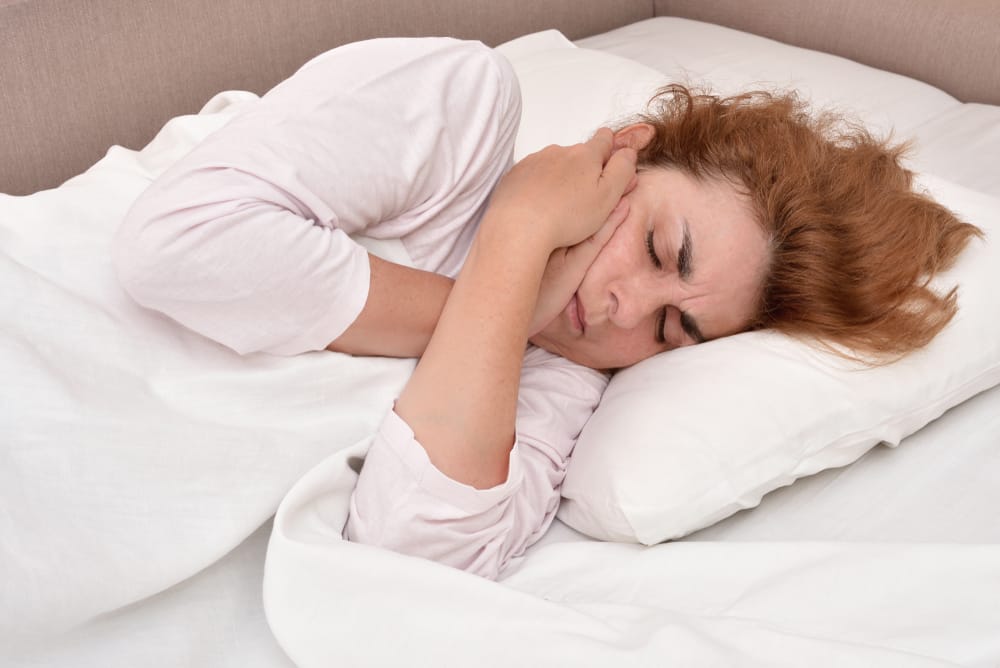 How often do you get a perfect night of sleep? According to a survey, only 6% of Brits awake feeling refreshed.[i] Humans need rest like a phone needs charge – without it we cannot fully function. We all know how minimal sleep impacts the following day: the yawns are long, the stretches big and all we want is a bed.
How often do you get a perfect night of sleep? According to a survey, only 6% of Brits awake feeling refreshed.[i] Humans need rest like a phone needs charge – without it we cannot fully function. We all know how minimal sleep impacts the following day: the yawns are long, the stretches big and all we want is a bed.
Associated with poor sleep is temporomandibular joint disorder (TMD). This has a high prevalence, affecting up to 25% of the general population.[ii] Common symptoms include:
TMD symptoms therefore impact daily life, including sleep quality.[iii] Without consistent rest, physical health, emotional wellbeing and daytime performance lapse. This is why dental practitioners must help at-risk TMD patients with getting the sleep they need.
88% of patients with chronic pain reported sleep problems. Elsewhere, more than 40% of patients with sleep problems reported chronic pain.ii The relationship between the two is clear and both worsen the symptoms of the other. 90% of TMD patients are likely to experience poor sleep quality. Older demographics and women are at a greater risk.ii
The relationship between poor sleep and TMD is reciprocal. Intense pain of the temporomandibular joint (TMJ) prevents patients from sleeping in comfort, so each following day is marked by tiredness. Mental exhaustion can increase stress and anxiety, leading to tooth grinding.[iv] Body fatigue causes repeated yawning – an action that opens the jaw as wide as possible. In both cases, fatigue worsens TMD symptoms. But how can this be prevented?
Healthier sleeping patterns can help break the vicious cycle. In the UK, 54% of people spend the recommended 7-8 hours in bed, but only 34% spend it asleep.[v] Interruptions come from a variety of sources: phones, partners, temperature changes, noises and pain. For a better night’s sleep, the following are recommended:
Those with snoring partners could also try ‘sleep divorce’. This recent trend sees partners sleep in separate beds for an uninterrupted night. Such measures can increase the amount of deep sleep achieved per night. Deep sleep replenishes energy, stores memories, and strengthens the immune system.[vii] As such, it is vital for physical and mental wellbeing. Without quality sleep, the risk of complications like heart disease and depression increases.[viii]
Diet is also vital. Regular consumption of milk products, fish, fruit and vegetables is encouraged for their sleep-promoting effects.[ix] Moreover, a healthy diet matched by regular exercise can reduce high levels of the stress hormone cortisol, improving sleep and reducing tooth grinding.[x]
Whilst maintaining a consistent sleeping pattern of quality rest can prevent TMD symptoms from worsening, this should be done in tandem with rehabilitation exercises for an optimal outcome. The OraStretchâ Press Rehab System from Total TMJ is an ideal solution for at-home physical therapy. Easy to use thanks to its simple yet effective design, it stretches the jaw and orofacial muscles to restore function and flexibility to the TMJ. Diligent use of the OraStretchâ Press can reduce TMD symptoms for a life less impaired by chronic pain and sleepless nights.
Irregular or insufficient sleep reduces quality of life and can lead to adverse health conditions. By breaking the vicious cycle, TMD and interrupted sleep can be history.
For more details about Total TMJ and the products available, please email info@totaltmj.co.uk
[i] The Sleep Matters Club. (2024). The 2024 UK Sleep Survey | Sleep Matters Club. [online] Available at: https://www.dreams.co.uk/sleep-matters-club/sleep-survey-2024.
[ii] Lee, Y.-H., Auh, Q-Schick., An, J.-S. and Kim, T. (2022). Poorer sleep quality in patients with chronic temporomandibular disorders compared to healthy controls. BMC Musculoskeletal Disorders, 23(1). doi:https://doi.org/10.1186/s12891-022-05195-y.
[iii] NIH (2023). TMD (Temporomandibular Disorders). [online] www.nidcr.nih.gov. Available at: https://www.nidcr.nih.gov/health-info/tmd.
[iv] Chemelo, V. dos S., Né, Y.G. de S., Frazão, D.R., Souza-Rodrigues, R.D. de, Fagundes, N.C.F., Magno, M.B., Silva, C.M.T. da, Maia, L.C. and Lima, R.R. (2020). Is There Association Between Stress and Bruxism? A Systematic Review and Meta-Analysis. Frontiers in Neurology, 11(11). doi:https://doi.org/10.3389/fneur.2020.590779.
[v] The Sleep Matters Club. (2024). The 2024 UK Sleep Survey | Sleep Matters Club. [online] Available at: https://www.dreams.co.uk/sleep-matters-club/sleep-survey-2024.
[vi] NHS (2021). How to fall asleep faster and sleep better – Every Mind Matters. [online] nhs.uk. Available at: https://www.nhs.uk/every-mind-matters/mental-wellbeing-tips/how-to-fall-asleep-faster-and-sleep-better/.
[vii] Marcin, A. (2018). What Is Deep Sleep and Why Is It Important? [online] Healthline. Available at: https://www.healthline.com/health/deep-sleep#sleepstages.
[viii] Rigon, M., Obara, K., Paixão, L., Cardoso, J.R. and Junior (2024). Relationship between temporomandibular disorders and sleep disorders in adults: An overview of systematic reviews. Sleep Medicine, 124, pp.404–415. doi:https://doi.org/10.1016/j.sleep.2024.10.002.
[ix] St-Onge, M.-P., Mikic, A. and Pietrolungo, C.E. (2016). Effects of Diet on Sleep Quality. Advances in Nutrition, [online] 7(5), pp.938–949. doi:https://doi.org/10.3945/an.116.012336.
[x] Davidson, K. (2017). 11 Natural Ways to Lower Your Cortisol Levels. [online] Healthline. Available at: https://www.healthline.com/nutrition/ways-to-lower-cortisol.